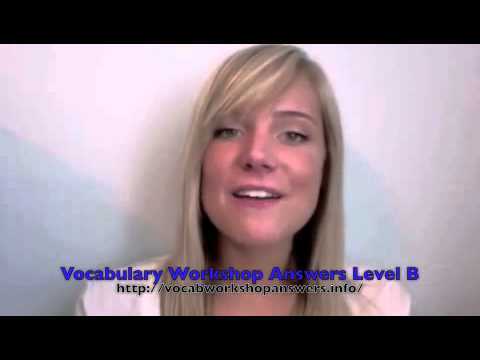
If you are a student currently studying vocabulary from Level C Unit 6 of the Vocabulary Workshop book, you have come to the right place. In this article, we will provide you with the answers to enhance your understanding of the English language and improve your vocabulary skills.
Vocabulary Workshop Level C is designed to help students expand their knowledge of words, their meanings, and their usage. Unit 6 focuses on different word groups, including vocabulary related to the environment, economics, and government. By completing the exercises in this unit, you will gain a deeper understanding of these topics and learn how to use the new words in the appropriate context.
By having access to the answers in Unit 6 of Vocabulary Workshop Level C, you can check your own progress and verify whether you have grasped the concepts correctly. It is important to review the answers and understand why they are correct, as this will help you retain the information more effectively. With the correct answers at your disposal, you can revise and reinforce your understanding of the vocabulary in Unit 6 more efficiently.
The answers to Vocabulary Workshop Level C Unit 6
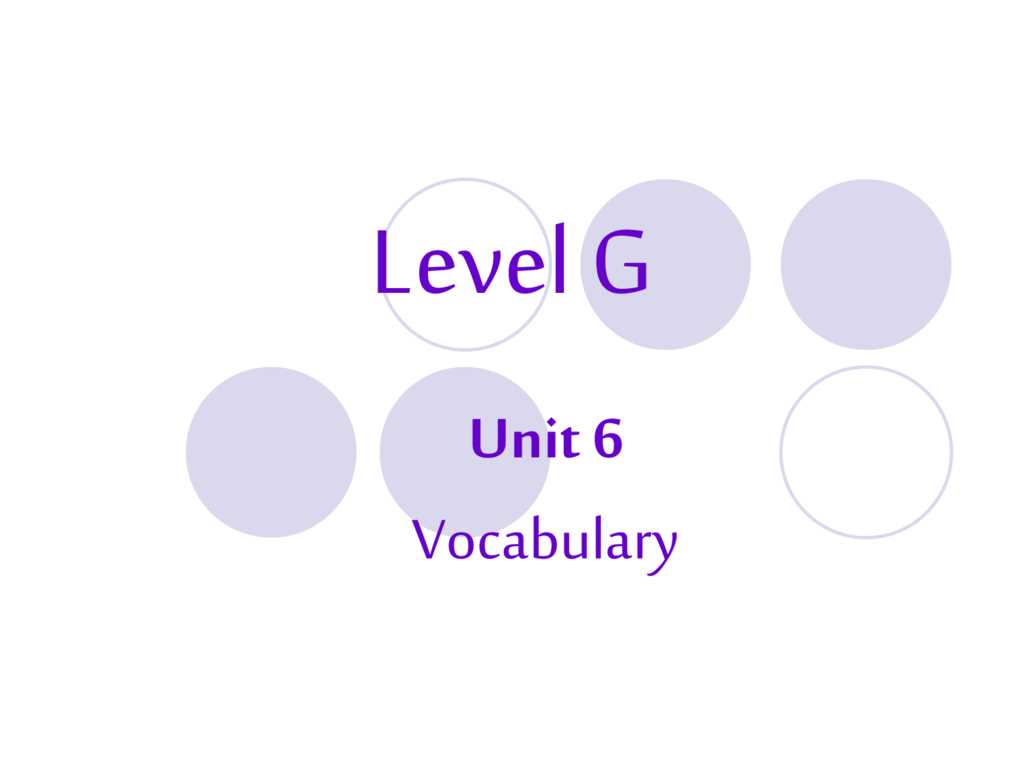
In Vocabulary Workshop Level C Unit 6, students are introduced to a range of new words and their meanings. By studying these words and their definitions, students can enhance their vocabulary and language skills. Here are the answers to the exercises in this unit:
Vocabulary in Context
- stint – a period of time spent doing a particular job or activity
- flagrant – extremely or obviously bad or shocking
- outlaw – to make something illegal or against the law
- limber – easily bent or flexible
- reprimand – a formal expression of disapproval or criticism
Completing the Sentence
- prevailed – emerged as the winner
- defied – refused to obey or comply with
- portly – stout or overweight
- muzzle – a device that covers the mouth of an animal to prevent biting or eating
- sundry – various or diverse
These are just a few examples of the words and their meanings covered in Vocabulary Workshop Level C Unit 6. By practicing these words and their usage in context, students can improve their vocabulary skills and become more effective communicators.
Understanding Vocabulary Workshop Level C Unit 6
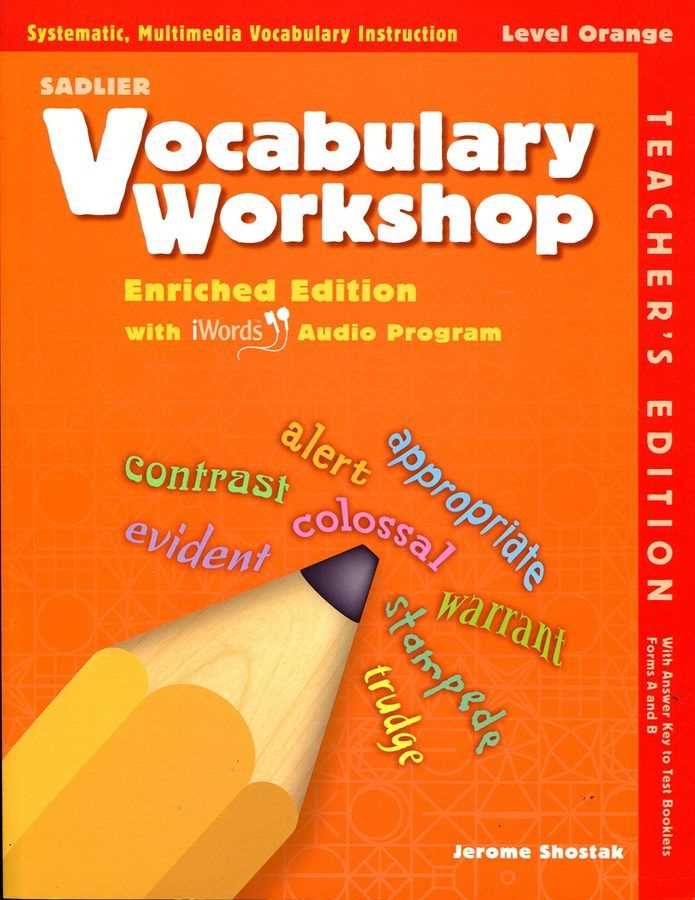
In Vocabulary Workshop Level C Unit 6, students will continue to expand their vocabulary through the study of different word groups and their meanings. This unit focuses on words related to music, theater, and entertainment. By understanding and using these words, students will be able to better express themselves and comprehend texts in these areas.
One important word group in this unit is related to musical terms. Students will learn words such as melody, harmony, tempo, and rhythm. These words are essential for understanding and discussing music. Students will also explore words related to theater, such as script, dialogue, stage, and audience. Understanding these terms will allow students to analyze plays and performances more effectively.
The unit also introduces words that are commonly used in the entertainment industry. Words like celebrity, premiere, paparazzi, and blockbuster are important for discussing popular culture and media. By studying these words, students will be able to engage in conversations and write about current entertainment trends.
- Key words in Vocabulary Workshop Level C Unit 6:
- Melody
- Harmony
- Tempo
- Rhythm
- Script
- Dialogue
- Stage
- Audience
- Celebrity
- Premiere
- Paparazzi
- Blockbuster
Overall, Vocabulary Workshop Level C Unit 6 provides students with the opportunity to learn new words and expand their vocabulary in the context of music, theater, and entertainment. By mastering these words, students will be better equipped to express themselves and understand texts in these areas.
The Importance of Practicing Vocabulary Skills
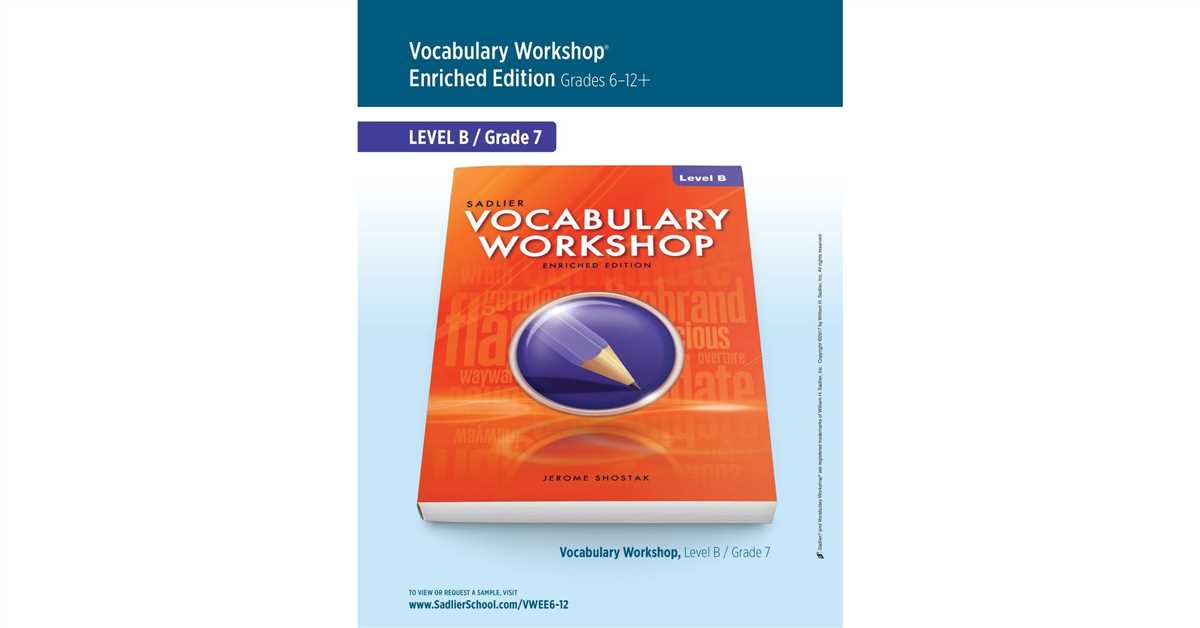
Having a strong vocabulary is essential for effective communication and academic success. A wide range of vocabulary allows individuals to express their thoughts and ideas precisely, helping them become more persuasive and articulate. Moreover, a rich vocabulary enables individuals to comprehend what they read or hear, fostering better learning and critical thinking skills. Therefore, practicing vocabulary skills is crucial in building language proficiency and achieving personal and professional goals.
One way to improve vocabulary skills is through regular reading. Reading exposes individuals to various words and contexts, helping them expand their vocabulary naturally. By encountering unfamiliar words and phrases, individuals can deduce their meanings from the context or using strategies like analyzing word roots, prefixes, or suffixes. Additionally, reading different types of texts, such as novels, newspapers, or academic articles, broadens vocabulary across multiple domains and enhances overall language comprehension.
Another effective method to practice vocabulary skills is through deliberate practice, such as using flashcards or completing vocabulary exercises. Creating flashcards with new words and their definitions helps reinforce memory retention and prompts regular review. Flashcards can be used for individual study or in a group setting for interactive learning and testing. Completing vocabulary exercises, such as synonyms, antonyms, or analogies, challenges individuals to think critically and apply their knowledge in different contexts, further strengthening their vocabulary skills.
In conclusion, practicing vocabulary skills is invaluable for effective communication, academic success, and personal growth. Whether through reading diverse materials or engaging in deliberate practice methods like flashcards and vocabulary exercises, individuals can broaden their vocabulary, enhance language comprehension, and improve core language skills. By investing time and effort into honing vocabulary skills, individuals equip themselves with a powerful tool for self-expression, understanding, and continuous learning.
Exploring the different types of exercises in Unit 6
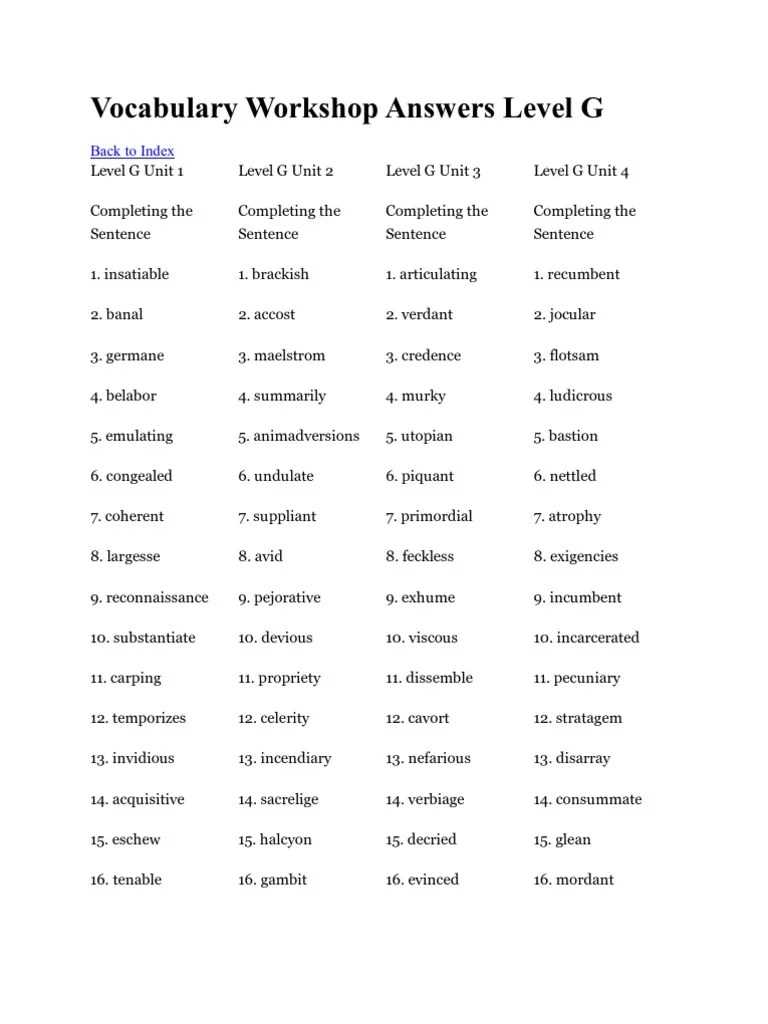
In Unit 6 of the Vocabulary Workshop Level C, there are several types of exercises that help students practice and reinforce their knowledge of new words and their meanings. These exercises are designed to be engaging and interactive, allowing students to apply their learning in a variety of contexts.
One of the exercises in Unit 6 is the synonym matching activity. In this exercise, students are given a list of words and asked to match each word with its synonym. This activity helps students expand their vocabulary by learning alternative words that have similar meanings. It also helps them recognize and understand the nuances of word usage.
Another exercise in Unit 6 is the sentence completion activity. In this exercise, students are given a sentence with a missing word and are asked to choose the correct word from a list of options. This activity helps students improve their understanding of word usage in context and their ability to select the most appropriate word to complete a sentence.
The third type of exercise in Unit 6 is the vocabulary word search. In this activity, students are given a grid of letters with hidden vocabulary words. They have to find and circle the words in the grid. This exercise helps students reinforce their knowledge of word spelling and recognition, while also giving them a fun and engaging way to practice their vocabulary skills.
Overall, the exercises in Unit 6 of the Vocabulary Workshop Level C provide students with a comprehensive and interactive approach to learning new words and their meanings. These exercises help students develop a strong vocabulary foundation and improve their language skills through practice and application.
Common challenges students might face in Unit 6
Unit 6 in the Vocabulary Workshop Level C presents students with a variety of new words and concepts to learn. While this can be an exciting opportunity to expand their vocabulary, it can also present certain challenges. One common challenge that students might face is the sheer volume of new words to memorize. Unit 6 introduces words like “adept,” “anomaly,” and “candid,” among many others. Keeping track of all these new words and their meanings can be overwhelming for some students.
Additionally, another challenge students might face in Unit 6 is understanding and correctly using words with multiple meanings. For example, words like “apt” and “clique” have different meanings depending on the context in which they are used. It can be confusing for students to remember and apply these multiple meanings accurately. To overcome this challenge, students need to carefully read and analyze the sentences in which the words are used to grasp their intended meanings.
To further compound the challenges, Unit 6 also introduces words with complex spellings or pronunciations. Words like “chide,” “frugal,” and “gregarious” might be difficult for some students to spell or pronounce correctly. This can hinder their understanding and retention of the words. In such cases, it is important for students to practice and review the pronunciation and spelling of these words regularly to build their confidence and fluency.
In conclusion, Unit 6 of the Vocabulary Workshop Level C presents students with various challenges. These challenges include the volume of new words to memorize, understanding words with multiple meanings, and grappling with complex spellings and pronunciations. By actively engaging with the material, practicing regularly, and seeking guidance when needed, students can overcome these challenges and successfully expand their vocabulary.
Strategies for Improving Vocabulary Skills in Unit 6
In Unit 6 of the vocabulary workshop, students are introduced to a variety of new words and concepts. To fully understand and use these words in their everyday lives, it is important for students to develop effective strategies for improving their vocabulary skills. Here are some strategies that can help:
- Contextualize the words: When encountering new words, try to understand their meaning by looking at the context in which they are used. Pay attention to the words that surround the unfamiliar word and try to infer its meaning based on the sentence or paragraph.
- Use flashcards: Create flashcards for the new words and their definitions. Review them regularly and test yourself to see if you can recall the meaning of each word without looking at the definitions. This can help reinforce your memory and make the words more familiar.
- Practice active reading: When reading texts, make a habit of underlining or highlighting unfamiliar words. After finishing the text, go back and look up the meanings of these words. This active reading technique can help expand your vocabulary and improve your comprehension.
- Engage in word games and puzzles: Word games, such as crossword puzzles or word searches, can be a fun and interactive way to learn and retain new vocabulary. These games challenge your brain to recall and recognize words in different contexts.
- Write and use the words in sentences: Take the new words and try to use them in your own sentences. This exercise helps reinforce your understanding of the words and how they can be used correctly in different contexts.
- Review and practice regularly: Set aside dedicated time each day or week to review and practice the new vocabulary words from Unit 6. Consistent practice will help reinforce your memory and improve your ability to use the words effectively.
By employing these strategies, students can enhance their vocabulary skills and build a strong foundation for future language learning. It is important to remember that improving vocabulary is an ongoing process, and regular practice and exposure to new words is key to expanding one’s linguistic abilities.
Q&A:
What are some strategies for improving vocabulary skills in Unit 6?
Some strategies for improving vocabulary skills in Unit 6 include reading extensively, using flashcards to practice new words, creating word lists and reviewing them regularly, using online tools and resources, and engaging in conversations and discussions where you can actively use the words.
How can reading extensively help improve vocabulary skills in Unit 6?
Reading extensively exposes you to a wide range of words and their usage. By reading different genres and materials in Unit 6, you can encounter unfamiliar words and learn their meanings in context. This helps expand your vocabulary and improves your understanding of Unit 6 topics.
What are flashcards and how can they help improve vocabulary skills in Unit 6?
Flashcards are small cards that have a word on one side and its definition or usage on the other. By regularly practicing with flashcards, you can reinforce your memory of new words and their meanings. This makes it easier to recall and use them correctly in your Unit 6 studies.
Why is creating word lists and reviewing them regularly important for improving vocabulary skills in Unit 6?
Creating word lists helps you organize and categorize new words you come across in Unit 6. By reviewing these lists regularly, you can reinforce your memory and understanding of the words. This makes it easier to remember and use them effectively in your studies.
How can online tools and resources help improve vocabulary skills in Unit 6?
There are various online tools and resources available that offer vocabulary exercises, games, and quizzes related to Unit 6 topics. By using these resources, you can practice and reinforce your understanding of new words. Additionally, many online platforms provide interactive tools that make vocabulary learning engaging and fun.